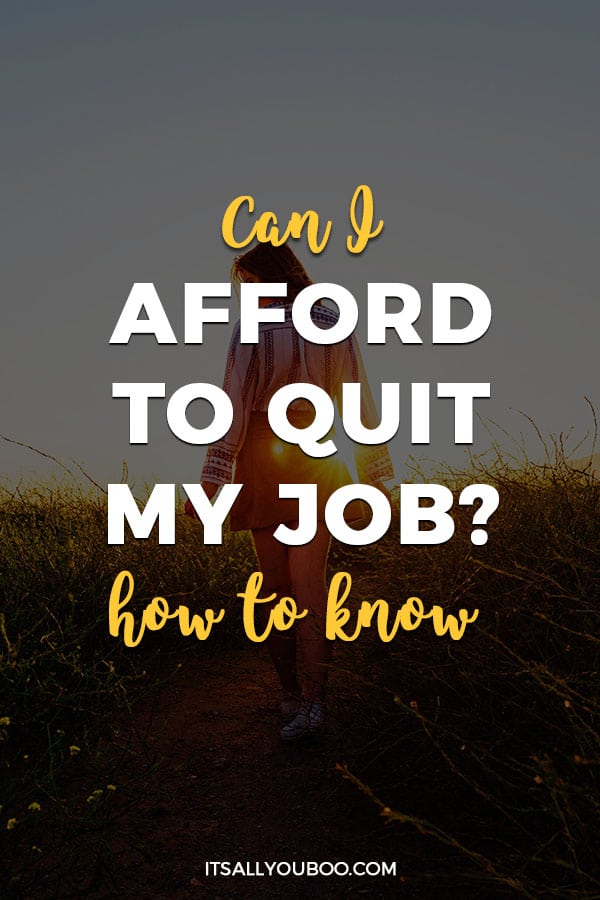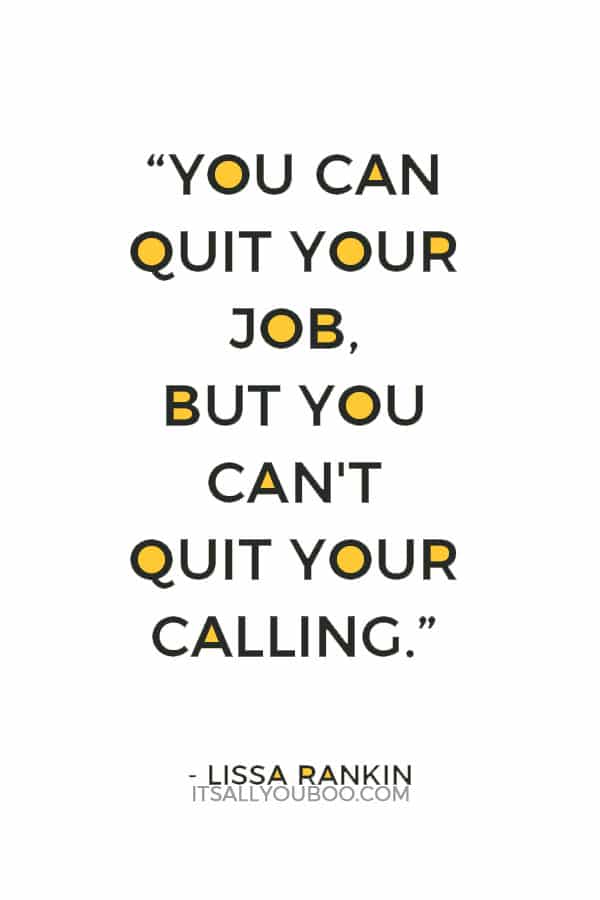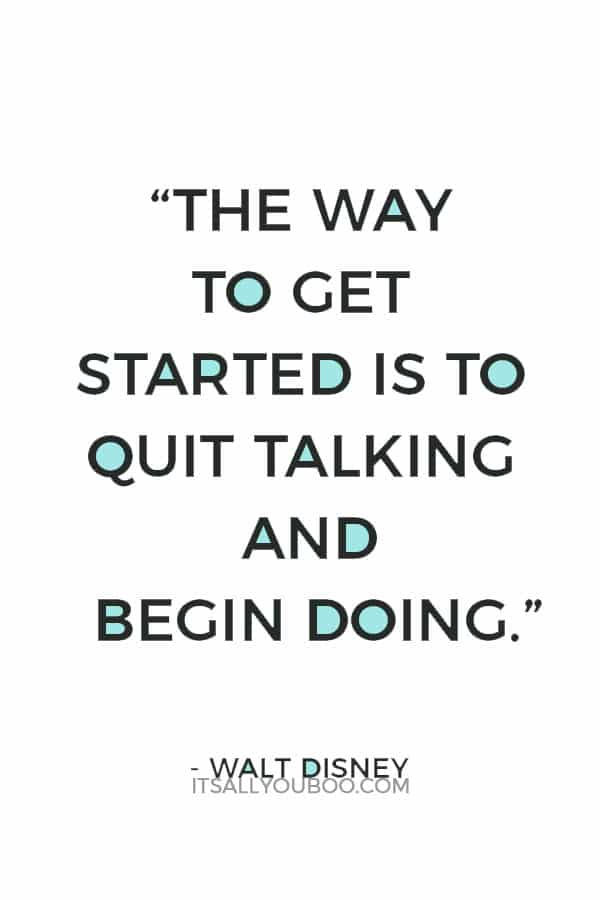Can you actually afford to quit your job?
Do I need a checklist before quitting job?
How do you know when you’re officially ready to start freelancing and be your own boss?
These are questions you should ask yourself today if you want to become a successful entrepreneur or want to be a freelancer and work from home.
Financial planning is crucial to being able to afford to quit your job without going broke.
Without it, you risk your new business (or yourself) starving due to lack of cash flow and ending up bankrupted or even worse back living with your parents!
So if you currently hate your job and want to quit and be your own boss, you need to ask yourself honestly, “Can I afford to quit my job?”
Table of Contents:
- Can I afford to quit my job if I’m broke?
- The calculations you need to do to quit your job
- Can I afford to quit my job if I’m in debt?
- What savings do I need to afford to quit my job?
- How do I set up my business finances?
- Final tips so you can afford to quit the 9-5
- Get your Free Quit the 9-5 Budget Spreadsheet
According to the Small Business Administration Office of Advocacy, 80% of new business start-ups make it through their first year. With appropriate financial planning, you can avoid becoming one of the 20% that don’t.
Over the 14 years, I’ve been a business consultant I’ve been part of 100’s of start-ups and I have noticed critical things a business does in their first year that cause them to succeed or fail.
Without a doubt, it comes down to how seriously the new entrepreneur takes their business finances, how organized they are, and having clear financial plans in place for the first year of being their own boss.
The entrepreneurs who do this are way ahead of the game from the beginning.
The very first question they ask themselves is “Can I afford to quit my job and start this business?” because they know without enough money it will simply fail and be a big waste of their time and resources.
In this post, I will equip you with a plan, checklist and a spreadsheet to make sure you are totally prepared.
You will then be able to confidently say to anyone who asks “Yes, I can afford to quit my job!” and mean it!
THIS POST MAY CONTAIN AFFILIATE LINKS.
IF YOU MAKE A PURCHASE FROM THESE LINKS, I MAY EARN A SMALL COMMISSION.
CLICK HERE FOR MY FULL DISCLAIMER STATEMENT.
Can I afford to quit my job if I’m broke?
If you are currently broke and struggling, you need to get more stability in place before adding the stress of irregular business income on top of an already fragile situation.
Becoming an entrepreneur requires you to be very disciplined with your money and you need to make sure you’re actually cut out for this life as a new entrepreneur.
In order to afford to quit your job, it’s important to understand why you are currently broke.
Being broke is due to a number of things and may include:
- Lack of Impulse control
- FOMO
- Shiny object syndrome
- Short term focus
- The pressure of 9-5 job causing anxiety
👉🏽 RELATED POST: How to Set Goals to Escape the 9 to 5
Before you quit the 9-5 and become your own boss, practice working with a more limited budget than usual to prepare for the irregular income of a new start-up business.
You can also prepare for quitting the 9-5 by:
- Cutting your expenses back hard
- Getting rid of debt and stop using credit
- Starting a savings plan and stick to it
- Shifting your focus from being spontaneous to planning and being disciplined
You can safely quit your job when you have a strong financial position with limited debt; are comfortable living within your means and have savings to live off when things are quiet in your business.
You also need to possess the discipline required to tighten your financial belt and keep the business afloat when things get rough.
These simple changes will put you in a much stronger financial position so you can afford to quit your job.
The calculations you need to do to quit your job
To know with any degree of certainty if you can afford to quit the 9-5 you need to get honest with yourself and look at where you stand financially.
It’s going to be ugly and you may cry but you need to face your circumstances bravely and honestly before going into your own business and being your own boss.
You must know your numbers. Complete the following calculations and get prepared.
#1. Current Net Worth
To calculate your net worth you add up assets you own and deduct your total debts.
Assets are items of significant value that can be easily converted into cash. They usually (not always) have the ability to earn passive income on their own. Things like a bank account earning interest, stocks generating dividends, property generating rents are all examples of common assets.
Debts operate the opposite way. On money you owe, interest is generated adding to the amount you need to pay back. Student loans, credit card debt, car loans are all examples of debts.
Add up all your assets and deduct your debts, this is your personal equity. Ideally, in order to quit the 9-5 it should be zero or at least a positive number. If not, you will need to pay down your debts in order to quit your job.
The only time this isn’t the case is if your debts are very long term (student loans, mortgage etc.) as it’s not practical to wait 20 years until your mortgage is gone to start your business.
As long as you have the 6 months of minimum payments put aside in your emergency fund you’ll be good to go.
👉🏽 RELATED POST: How to Achieve Your Financial Goals
#2. Budget
Doing a budget will help you see if you are currently living within your means and ensure you know exactly how much your essential expenses are. Once you know this figure you can then see the minimum amount of income the business needs to generate to be sustainable.
To prepare a budget, add up all income you received for the last 3 months and divide it by 3. This is your average monthly income. Then do the same for your expenses.
It may help to categorize your expenses into groups so you can see exactly where your money is going and where you can cut back.
Use your bank and credit card statements to guide you and record any cash expenses you may have.
Averaging them like this captures irregular spending giving you a more accurate monthly target to work with. If the last 3 months include the Christmas period I suggest doing 6-month average instead for both income and expenses, to get a more accurate idea of a ‘normal’ month.
A Simple Monthly Budget Example
| Income | |
|---|---|
| 9-5 Job (Inc Tips / Bonuses) | $2,500 |
| Side Hustle Money | $500 |
| Insterest / Dividends | |
| Other Income | |
| Total Income | $3,000 |
| Expenses | |
|---|---|
| Housing | $1,500 |
| Food | $500 |
| Travel | $50 |
| Medical Care | |
| Entertainment | $50 |
| Clothing | $100 |
| Personal Care | |
| Insurance | $250 |
| Utilities | $120 |
| Debt Repayment | |
| Retirement Contributions | $30 |
| Savings | $100 |
| Total Expenses | $2,700 |
Income – Expenses = Available money for the business
($3,000-$2,700 = $300)
Deduct your total expenses from your income. You should have a positive figure. If you don’t you will absolutely need to cut back your expenses or increase your income somehow before you quit your 9-5 job.
Check out posts online to help you prepare a detailed personal budget.
Hopefully, now you can easily say ‘I can afford to leave my job!” and are currently writing your resignation letter, but what if you aren’t quite ready because you have too much debt?
Can you still afford to quit your job?
Can I afford to quit my job if I’m in debt?
It’s going to be very stressful trying to quit your job if you’ve got lots of debt.
With a new business you don’t have regular income as you do with your 9-5, so making regular debt payments are going to be rough on top of feeding a cash-hungry newborn business.
Therefore, once you have established your starting point you need to start cleaning up your current financial mess.
It’s really best to pay off as much debt as possible before quitting your 9-5 job.
Ways to get on top of your debt before leaving your job:
- Make extra repayments
- Pay debt weekly or fortnightly (means extra payments vs paying monthly)
- Refinance to lower repayments (be very careful of your credit rating, avoid if it’s low)
- Sell personal items to put money on your debt
- Start your business part-time in addition to your 9-5 job – put business profit on debt
- Earn extra money doing side hustles such as lawn mowing, uber driving etc.
- Cut your expenses and put extra savings on debt
👉🏽 RELATED POST: Legit Ways to Make Money at Home
Once you have cleaned up your existing debt you need to avoid going into new business debt.
So when quitting your 9-5 always prepare for things to take longer than expected.
Keep your business expenses low by:
- Trimming your day to day expenses right back
- Only buy things for the business that are absolutely necessary (no Kikki K isn’t essential 😊)
- Have an emergency fund for at least 6 months business and personal expenses (12 is better)
- Make sure you have a contingency plan in place to earn extra money
- If practical, adjust your major living expenses to make things easier financially (trade down vehicle, cheaper housing)
What savings do I need to afford to quit my job?
You cannot quit your day job without savings, but you and your future business will suffer.
Savings you need to have in place so you can afford to quit your job and go full time in your new business are:
- 6-12 months living expenses
- Start-up capital
- Money to prepay big expenses before you quit your 9-5 job
- A cash buffer for unexpected business expenses
#1. 6-12 Months Living Expenses
As discussed above, 6-12 months of living expenses need to be put aside so you can still keep your life running while business is slow. This will help you afford to quit your job as you’ll need less income to cover these expenses while your new business is finding its feet.
To be clear this amount isn’t your current gross income, it’s the amount of your actual necessary living expenses calculated above when you did your budget (Housing, utilities, insurance, medical etc.).
#2. Start-up Capital
You will need to save up your start-up costs in advance so you can afford to quit the 9-5 and your business can actually start operating. Start-up costs are different for every type of business.
If you are a freelance designer working from home you will need to put aside the following start-up costs:
- Domain Name, Website Hosting / Theme
- Legal Contracts and Legal Templates
- Accounting Costs (if forming LLC)
- Insurance
- Advertising
- Home Office Expenses (Desk, office chair, filing system etc.)
- Startup Technology (Computer, Printer etc.)
- Software used in freelancing (e.g. Photoshop)
- Social Media Marketing Tools (e.g. Tailwind)
- Accounting Software
- Stationery & Printing Expenses (Business Cards, Flyers, Paper, Packaging, Files)
- Coworking Space
👉🏽 RELATED POST: Best Affordable Business Tools for Beginner Bloggers
Research all of these costs before you quit the 9-5 so you know what they are.
Be sure to record the due date of any expenses that are only for 12 months (like web hosting) in your cash flow or calendar so you can put money aside during the year. Because you signed up for everything at once you’ll get hit with all of them in the same month in 12 month’s time!
A pro tip: many of my successful clients always paid their big start-up expenses in advance before they quit their 9-5 job.
#3. Cash Flow Buffer
Forbes states running out of capital as the second highest reason small businesses fail.
When you start making money from your new work at home business it will be very tempting to drain the bank account however, you need to plan for things like slow paying clients, taxes, suppliers asking for prepayment, times with no clients, you being sick (as you are human!) etc.
Having a cash buffer in place means your business can still operate when things get tight without having to scramble and pull out every credit card you have! It’s really worth the peace of mind and part of being your own boss you plan for these things in advance.
Like with your personal expenses it is great if you can build up to having 6-12 months of business expenses safely tucked away in a separate bank account out of sight.
You can do this as you go, but the more you have at the beginning the less you need to find later.
In order for you to live during this initial build-up phase, it’s so important to have your emergency fund stocked so you can afford to quit the 9-5 and not go broke.
How do I set up my business finances so I can afford to quit my job?
Set up your business finances the smart way.
It’s so wise to set your business finances up properly before quitting your 9-5 job.
Once you are in the thick of finally being your own boss you just won’t have the brain space or time to do it properly.
If you can’t afford to quit the 9-5 you will panic and go back to your job. Setting a strong financial foundation in your business will help you avoid this.
I want your transition to be easy and headache free, doing the following will set you up for success from day 1.
That way you won’t fail to create your dream job, but instead, be a part of the 20% that succeeds!
Set up separate business bank accounts
It’s really important to have a separate bank account for your business so your allowable business deductions aren’t buried in your personal bank account and get missed.
You will need at least 3 different bank accounts to manage your business finances:
- Separate business bank account for daily operations (no commingling)
- Tax savings & payroll bank account (at least 30% per month profit and one month’s payroll)
- High-interest bank account (to park your cash buffer money)
How to save for business taxes
As you are now your own boss you will need to be responsible for setting aside your own taxes to keep sweet with the taxman.
I can’t tell you how many clients call me frazzled and disorganized messes, 2 weeks before their taxes are due pleading for me to help them.
This costs them heavily due to extra emergency accounting fees and personal emotional trauma.
Don’t let this be you.
👉🏽 RELATED POST: How to Manage Your Side-Hustle Income
It’s easy to provide for taxes simply by being organized. Each month add up your total income and deduct your related business expenses. This figure is your profit before taxes.
Everyone’s personal situation is different so if you know your personal tax rate use that, if you don’t then a good rule of thumb is a 30% tax rate as its where most people tend to sit.
You may still need to pay extra income tax but this will hopefully only be a small amount, just be prepared for this.
Income – Expenses = Profit x 30% = Put aside for tax savings.
If your profit is high (unusual for a new business) you really should speak to your CPA to get your tax withholding rate from them to be safe.
As mentioned above, park this in a super special high-interest savings account (fee free) on its own and don’t touch it!
This money was never yours so don’t get emotionally attached to it. You are a business boss now and that means doing tax collection!
Do a basic cash flow projection and business budget
Even if this is just on a calendar write down your big expenses like stock purchases, taxes, payroll, loan installments etc. so you get some notice these are coming your way.
Review each month in advance so you can save up for them if required.
👉🏽 RELATED POST: How to Budget Your Money with Sinking Funds
Final tips so you can afford to quit the 9-5
- Be disciplined with your business finances. This is key to your success!
- Saving before quitting the 9-5 puts good habits in place and provides a safety net when times get rough.
- Don’t raid the tax savings or the business savings unless you are in dire need.
- Stick to the budget and it will protect you.
- Regularly look at your money to identify trouble early or spot opportunities to expand.
- Hire professional help (like me!) if money just isn’t your thing.
So do you think you can say ‘I can afford to quit my job’ now?
I really hope so. 😊
Before you quit, set yourself up for success
So many beginner entrepreneurs quit their job without seeing if they can actually afford to do so. This leads to a lot of agony and distress down the track.
Honestly looking at your current financial situation, paying off any consumer debt, saving 6-12 months expenses to live on and using a budget are really essential before quitting your job.
Giving yourself some lead time to pay for the business start-up costs and prepay big business expenses in advance is really wise and will set you up well from day 1.
👉🏽 RELATED POST: Should I follow my dreams or be realistic?
Remember you are building a long-term business here. It’s not just something to jump to so you can escape your 9-5 job (Even though I know you are dying to!).
It is really important to take the time to carefully plan how you are going to afford to quit the 9-5 and support yourself in the first 12 months as a new entrepreneur. You don’t want to end up broke and owing people money!
If you follow the steps in this post I know you will be set up to be one of the 80% of new businesses that succeed in their first year and you will go on to thrive financially for many years after that 😊
Get Your Quit the 9 to 5 Budget Spreadsheet
Ready to quit your day job and become your own boss? To prepare yourself to become an entrepreneur? Awesome, get the Simple Budget Spreadsheet, compatible with Google Docs and Microsoft Excel. Create your budget, track expenses and let’s calculate your exit strategy.
Checklist to Afford to Quit Your Day Job
To summarise here is a checklist you can use to decide if you can afford to quit your 9-5 job:
- Honestly look at why you are currently broke
- Get rid of any short term consumer debt
- Assess your current financial situation
- Create and use a budget
- Save 6-12 month’s living expenses
- Cut back any non-essential spending (business and personal)
- Calculate start-up business costs and set aside money before quitting your job
- Prepay any business expenses you can as well
- Set up separate business bank accounts – don’t commingle with personal funds
- Provide an amount for tax savings and payroll (if you have it)
- Don’t raid your business bank account early and save extra for the unexpected.
- Consider keeping your 9-5 part-time until your new business is self-supporting
Over to you…
Can you honestly say – ‘I can afford to quit my job?’
What steps are you taking to prepare for this awesome day?
Is there anything you worry about when quitting your 9-5 that’s not included?
Let us know in the comments below.
Are you thinking about leaving your day job? But are you broke and in so much debt? Click here to get your answer to, 'Can I quit my job' by a financial planner. #QuitYourJob #SelfEmployed #Finances #MoneyTalk
Can you afford to quit your job? And will you leave the 9-5 behind?

More About Guest Contributor
Creating financially fierce and empowered women.
A personal finance blogger, financial planner, and small business consultant, Bethany Holt is extremely passionate about helping women achieve financial independence and gain confidence with their money.
Recently graduating in the top 15% of her university finance class and doing it all as a single mother on a budget, Bethany now helps women rein in their spending and start profitable businesses, so they never have to rely on anyone for financial support. Ever again!
Having worked with small businesses as a consultant for 14 years and teaching accounting for 4 years, Bethany loves sharing her money skills with others.
Last Updated on July 23, 2024

















Viano Dee says
These are very legit points. They need to be taken very seriously. Entrepreneurship is no joke.
Bethany says
You are so right Viano!
So many people quit without a plan because they simply can’t stand their 9-5 anymore.
As you mentioned working for yourself isn’t easy, and things always take longer than you think.
That’s why it’s so important to have savings or an income source established before taking the leap.
Madi Rowan says
What wonderful questions to think about. This is one day my goal, I’m not quite there yet, but I’m committed to working towards it! 🙂
-madi xo |
Bethany says
Good for you Madi!
You’re so smart to be thinking things through and taking your time.
I’m sure your time will come 🙂
Beth x
Nicolet Finger says
Literally so helpful! I will definitely be taking some of your tips to support myself financially in my personal endevours
Bethany says
I’m so pleased it helps Nicolet!
I’m sure you’ll be set up for success now.
Nothing puts an end to following your dreams quicker, than running out of money!
Get your finances nice and strong before you go for it. Good luck!
Nadine says
I’m already a work from home freelancer and business owner and man I wish I could have read this before I stopped working my 9-5. So much great value and tips to make the transition. Passing this blog post right along to anyone who is thinking about quitting their 9-5.1
Bethany says
How true is it Nadine?
I’m so sorry we didn’t cross paths earlier!
The clients of mine who have had great success, have had their money sorted before they started.
That first year is a killer!
People are so impatient to get started, they fail to plan for the transition appropriately.
Panicking about money all the time really wrecks your confidence, and puts you in constant scarcity mindset.
You can’t think clearly, when you’re so worried.
Please spread the word and hopefully we can help save people from this agony 🙂
Thanks so much for your comment. I really appreciate it.
Beth x
Mira says
This is definitely not easy ! thanks for the valuable advice!
Bethany says
You are most welcome Mira 🙂
Karletta Marie says
Excellent tips. I am a traveler and I see the question “should I quit my job and travel?” quite often. Some people don’t realise that it takes time and planning to be able to set up a sustainable travel lifestyle. I’ve seen a number of people get caught, having to return to their 9-5 jobs.
Your article is great for helping people know when they are ready to move to the next step and how to get there. I’ll be sharing your article with the people I see asking that question. Thank you.
Bethany says
Yes Karletta sadly it happens so frequently and it’s rarely talked about.
Returning to the 9-5 is such a blow to the confidence.
You also lose a lot of momentum and focus which also sets you back.
Having a large amount set aside to live on, while you get your business established is really the key to avoiding this.
As you say it takes time and planning, which are easy to do.
Where people stumble is on having patience 🙂
Thank you for spreading the word. I truly hope this helps people build a sustainable freedom lifestyle.
Margaret Smith says
Great tips! I can’t wait until we’re ready for my husband to put in his two-week notice!
Bethany says
So exciting for you Margaret! Keep on saving and you’ll get there x
Sonja Hoff says
Excellent advice! I am so organized when it comes to my finances, and a lot of your recommendations are things I already do! I can’t wait to quit my job and be in business for myself–just have to work until I’m in the right place to do so! Thanks for sharing!
Bethany says
I’m so glad Sonja! You should be so proud of yourself.
With that approach you are bound to succeed.
I wish you the very best of luck in your new business venture. x
Mimi says
These are amazing tips, I wish I could quit my job but my blog doesn’t pay me enough so I’ll have to wait
It's All You Boo says
Hey Mimi,
Glad you love these tips on how to know if you’re financially prepared to quit your job. You’ll get there soon, best of luck on your journey to success!
Amber Myers says
You have some amazing info here and it’s great to keep in mind if you do want to quit your job.
It's All You Boo says
Hey Amber,
Agreed, financial planning and everything on this guide is definitely a few things to think about before quitting your job. Thanks for reading!
Tisha says
Definitely something to look into! I would love to be able to do this one day and working towards it now!
It's All You Boo says
Hey Tisha,
Quitting your job is definitely tough especially without financial planning. Claim it and best of luck on your journey to success!
Jasmine Martin says
This is such a great guide. I know I’ve been here so many times where I’ve wondered if I could afford to quit my job, but it’s so many things to think about and I’d have to save a decent amount if I really wanted to do it.
It's All You Boo says
Hey Jasmine,
Glad you love this. Agreed, quitting your job is the toughest especially when you have not saved enough for the future yet. You’ll get there pretty soon, so best of luck!